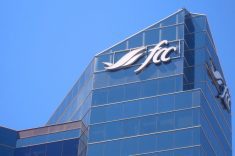Q: I seem to recall that in a column some years ago, you stated that improvements made by a tenant, such as a well or a fence, become the property of the landlord unless the lease states otherwise. This raises several other questions. Assume that a tenant builds a fence and the lease says that the fence remains the tenant’s property. Does this mean that the tenant gains an interest in the landlord’s land? If a landlord sells a fence to his tenant, does he also sell part of the land?
Read Also

Rural emergency room closures continue to be vexing problem
Staffing issues are at the root of disruptions and closures in hospital emergency departments, both in rural and urban Canadian locations.
A: A general rule of property law is that anything attached to land becomes part of the land and becomes the property of the landowner. So if Able builds a permanent machine shed on his land and then sells the land, the shed will belong to the new owner. The only exception would be if the sales agreement clearly allows Able to take the shed apart.
With leases, the general rule is that the tenant can remove any improvements made as long as they can be removed without damage to the landlord’s property.
Of course, this general rule arose from retail situations where tenants were deemed to have the right to remove shelves once the lease was over. The situation is more complex if the tenant builds something that is significantly attached to the land. Let’s take an extreme example. The tenant builds a fence on his landlord’s land using steel poles, which are cemented in and would be difficult to remove. In that case I would suggest the fence becomes a part of the land and the landlord’s property. Even if the lease agreement states the fence remains the property of the tenant, this does not give the tenant an interest in land.
Rather, it means that the tenant would have the right to remove the fence after the lease expires. If the lease does not specify the time period within which the fence must be removed, then the law would imply a term allowing the tenant a reasonable time to remove it.
Similarly, a landlord selling a fence to his tenant gives the tenant the right to use the fence during the life of the lease and the right to remove it within a reasonable period after the lease has expired.
For an interest in land to be sold, the agreement would have to make clear that land is being sold. An interest in land cannot be sold under the type of arrangement you describe.
As a matter of preventative law, I recommend landlords and tenants include a term in their lease to deal with improvements made to the land.
A common clause that appears in many farm leases reads:
“The tenant shall not make major improvements to the land or buildings covered by this lease, other than normal repair and maintenance, without written consent of the landlord. Major improvements, without limiting the generality of the term, shall include: well digging, drainage, erosion control, fencing, building construction, clearing and breaking land.
“Compensation for any approved improvements shall be such amount as agreed to in writing. Title to all improvements, whether made with or without consent, shall vest in the landlord and no improvements may be removed, sold or encumbered without the landlord’s consent.”















